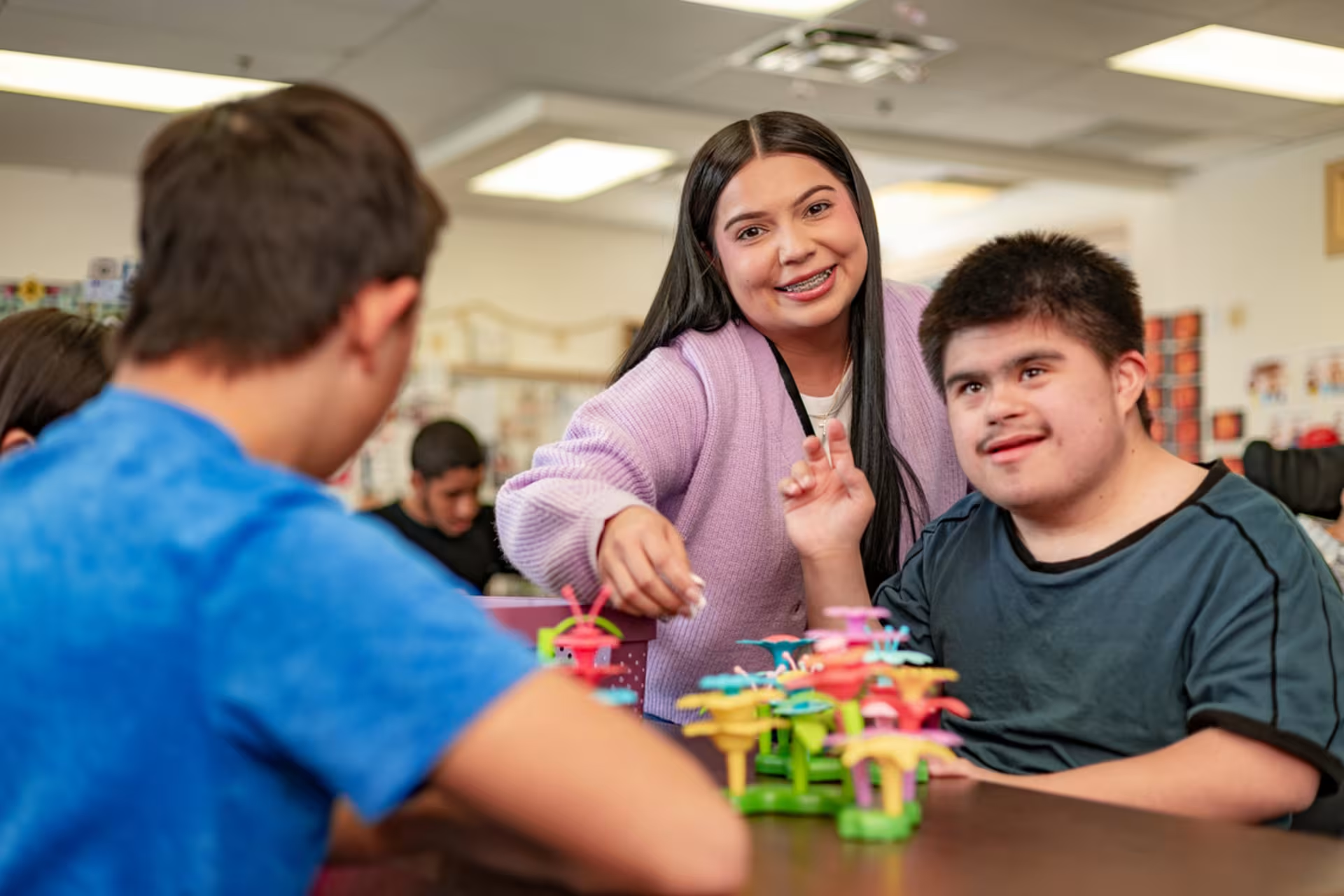
Master of Education in Early Childhood and Early Childhood Special Education (Non-Licensure) Degree
Become a Leader for Children With Diverse Abilities
Transform into a skillful and knowledgeable educator, advocate and leader with the Master of Education in Early Childhood Education and Early Childhood Special Education (Does Not Lead to Licensure) at Grand Canyon University (GCU). This program can empower you to help each student grow to his or her full potential while advocating at the school and district level for children in their early years of education.
Prepare to enter the field of teaching as a graduate of this non-licensure education degree program, equipped with best-practice pedagogy and methodologies as well as expertise in the psychosocial and familial needs of children with or without exceptionalities.

Up to 12 credits or 1/3 of the total program requirements in transfer (whichever is less)
Credits: Fill out the Lopes Eval to find out what will transfer
Admission Requirements (Master's)
- Undergraduate Degree*
- 2.8+ GPA
OR 2.5+ Unweighted GPA and
- GMAT: 500
- GRE: 300 combined**
Admission requirements may differ based on degree level, program and modality, or transfer status. Some programs of study may require a higher GPA and/or other qualifying criteria for admission. Please review full admission and program requirements in the University Policy Handbook.
* Degree must be from an accredited college or program that has been approved by GCU.
** Combined verbal/quantitative, after August 2011 (1,000 combined verbal and quantitative, prior to August 2011).
Complete Field Experience Aligned With National Teaching Standards
In addition to online coursework,(See disclaimer 1) you will complete a minimum of 105 hours of field experience within birth through grade 3 classrooms, in both special and general education environments. All courses are directly aligned with national teaching standards as prescribed by the Interstate Teacher Assessment and Support Consortium (InTASC), International Society for Technology in Education Standards for Educators (ISTE-E), National Association for the Education of Young Children Standards for Initial and Advanced Early Childhood Preparation Programs (NAEYC), and the Council for Exceptional Children Initial Practice-Based Standards Early Interventionists/Early Childhood Special Education (EI/ECSE).

Earn Your Degree Online With Flexibility
For learners who prefer to study from the comfort of their own home, this program offers an accessible and flexible online learning opportunity. The online modality of this early childhood special education master’s program provides the convenience of balancing your studies with other personal and professional commitments, allowing you the opportunity to gain valuable skills and knowledge while maintaining flexibility in your schedule.
Licensure and Non-Licensure Pathways
This version of the Master of Education in Early Childhood Education and Early Childhood Special Education degree does not lead to initial teacher licensure. This non-licensure education degree is recommended for educators, who are already licensed in an area other than early childhood, to enhance their career specialization or preparing for roles that do not require certification, such as within private or parochial organizations. GCU also offers an initial licensure version of the Master of Education in Early Childhood Education and Early Childhood Special Education for those seeking licensure.

Elevate Your Skills in Early Childhood Education
As a seasoned special educator seeking to elevate your expertise, this Master of Education in Early Childhood and Early Childhood Special Education can provide an avenue for ongoing professional growth. This program will focus on helping you acquire valuable leadership skills, foster and maintain effective teaching strategies, embrace collaboration and teamwork efforts and implement evidence-based practices. By honing these skills, you can empower yourself to create enduring influences on your students' educational journeys.
In this program, you will examine the following topics and concepts:
Career Paths for MEd Graduates
Graduates of this Master of Education in Early Childhood and Early Childhood Special Education (Non-Licensure) Degree are prepared as not only educators, but stewards of children. You will be taught how to make ethical decisions in the classroom, as well as advocate at the school, district and policy level. Focus is placed on your ability to recognize and assess behavior, initiate family and community collaboration and promote the education of young children with and without exceptionalities.
The non-licensure track is advantageous for those who are already licensed in an area other than early childhood or seeking roles that do not require teacher certification, including those within charter, private and early learning school environments. Other potential career paths include child development center leadership, family services and program consulting.

FAQs
If you have questions about pursuing this degree, we’ve gathered a few common questions to provide clarity.
Are there prerequisites to get into the non-licensure version of the MEd in Early Childhood and Early Childhood Special Education program?
Is practical experience required for a master’s in early childhood and early childhood special education degree?
Is an early childhood and early childhood special education master’s degree worth it?
Program Curriculum
Core Courses

Discover our master’s in early childhood and special education non-licensure program to lead your classroom with confidence.
If you are seeking licensure/certification, please refer to the "Accreditation and Compliance/State Disclosures” link for the specific program of interest’s website for your location and/or employment state’s licensure requirements, per 34 CFR 668.14(b)32 and 668.43(c).
- Excluding observational and practice-based experiences, and student teaching.


